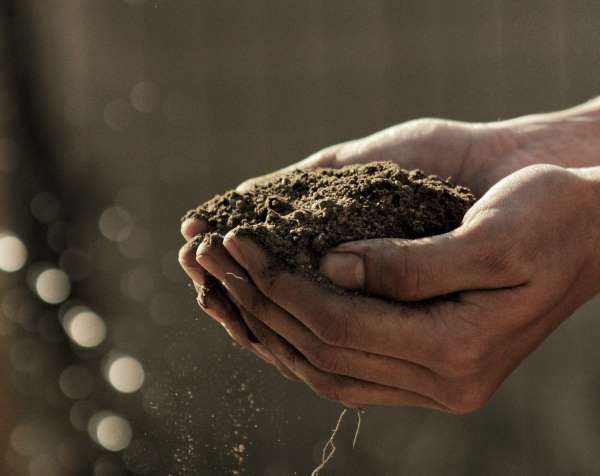Climate change is creating significant agricultural production challenges. Rising global temperatures are adversely affecting soil quality in arid regions. Africa notoriously struggles with crop production rates, which negatively impacts residents’ health and well-being.
Farmers can reduce climate change effects and erosion by improving soil organic carbon levels. Soil organic carbon may shrink the global carbon footprint and enhance the quality of air. It can also increase food production, which minimizes hunger.
What is Soil Organic Carbon?
Soil organic carbon is an organic matter compound. It is an essential part of soil fertility levels. Organic matter makes up nearly 10% of soil mass and helps retain nutrients and moisture.
Carbon supports ground-level ecosystems and powers photosynthesis. Environmentalists rely on soil organic carbon to facilitate sequestration. Carbon sequestration reduces the number of greenhouse gases in the atmosphere by storing surface-level emissions.
Individuals rely on vegetation to capture and store carbon dioxide beneath Earth’s surface. One tree may absorb and filter about 48 pounds of emissions annually. Improving atmospheric conservation can prevent adverse climate change effects, like overheating.
Climate change is increasing the frequency and intensity of droughts by raising Earth’s evaporation rate. Evaporation increases precipitation in some regions and leaves other areas in prolonged droughts. Minimizing drought effects is essential to supporting global nutrition.
Record Droughts in Africa
East Africa is experiencing a record-breaking drought. Farmers struggle to maintain sufficient crop yields as evaporation depletes their soil of nutrients. Researchers predict about 25 million individuals will experience water and food shortages by the middle of the year.
African droughts are causing severe cases of soil erosion. Farmers can maintain soil nutrient levels and abundant crop yields by storing carbon beneath Earth’s surface. Soil carbon sequestration also directly impacts atmospheric stability and helps the planet achieve life-sufficient surface temperatures.
Preventing Degradation with Soil Organic Carbon
Agricultural professionals may prevent ecological degradation by managing soil organic carbon levels. Individuals may measure organic carbon levels by identifying soil’s inputs and outputs. Improving soil organic carbon is the basis of sustainable farming.
Reducing emissions and improving ground-level ecosystem functions can lower drought rates. Increasing soil fertility significantly enhances global food security. It also enhances individuals’ lung health by minimizing atmospheric degradation.
Residents in high-pollution regions have increased risks of heart attacks, strokes, asthma attacks and lung cancer. Lowering air pollution with soil carbon sequestration prevents adverse health effects. Farmers also benefit from soil organic carbon enhancements.
Reducing soil erosion and nutrient depletion can lower crop loss. Agricultural professionals may lower their operation costs by conserving resources. Minimizing drought effects reduces watering demands, which improves farmers’ savings.
Reducing Global Hunger Rates
The critical benefit of soil organic carbon is reducing global hunger rates. Africa’s record-breaking drought period is significantly impacting individuals’ health and well-being. Farmers can improve food security by maintaining soil fertility levels and decreasing atmospheric degradation.
Agricultural professionals around the world may engage in soil carbon sequestration to improve food security. Syria, Afghanistan and Southern California experience high hunger rates from nutrient depletion. Global food producers can decrease the 811 million individual starvation rate by promoting sequestration.
Reducing global droughts also improves biodiversity. Soil erosion and vegetation depletion can cause forced migration. Animals experience endangerment without adequate access to food and shelter.
Forced migration also contributes to food insecurity because many humans consume meat. Reducing species’ endangerment may significantly improve individuals’ health and well-being. Agricultural professionals can also lower food scarcity from droughts by engaging in alternative conservation techniques.
Other Drought Prevention Techniques
Some farmers rely on rainwater harvesting systems to acquire enough water to maintain their crops. They can make the most of their stormwater supply during dry seasons by investing in drip irrigation systems. Drip irrigation is the optimum water delivery technique.
They may also invest in drought-resistant, engineered crops. Environmental scientists are minimizing climate change effects by creating sustainable crops. Farmers can also plant more trees in their production fields to help retain soil moisture for longer.
 Bio: Jane is an agriculture and environmental journalist and the founder and editor-in-chief of Environment.co, where she covers sustainability and eco-friendly living.
Bio: Jane is an agriculture and environmental journalist and the founder and editor-in-chief of Environment.co, where she covers sustainability and eco-friendly living.










[…] source […]
Comments are closed.